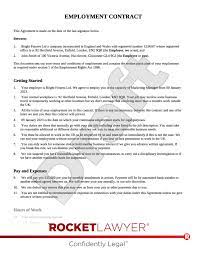
Understanding the Significance of Employment Contracts in the UK
The Importance of Employment Contracts
Employment contracts are crucial documents that establish the terms and conditions of the relationship between an employer and an employee. They serve as a legal agreement outlining the rights and responsibilities of both parties, helping to prevent misunderstandings and disputes in the workplace.
One of the key benefits of having a written employment contract is clarity. By clearly outlining details such as job duties, working hours, compensation, benefits, and termination procedures, both the employer and the employee have a clear understanding of what is expected from each party.
Moreover, employment contracts provide legal protection for both employers and employees. In case of any disagreements or breaches of contract, having a written document can serve as evidence to resolve disputes effectively.
Employment contracts also help to establish a sense of security and stability for employees. Knowing their rights, entitlements, and job expectations can boost morale and productivity in the workplace.
For employers, having well-drafted employment contracts can help protect their business interests by including clauses related to confidentiality, intellectual property rights, non-compete agreements, and dispute resolution mechanisms.
In conclusion, employment contracts play a vital role in setting clear expectations, protecting rights, and ensuring a harmonious work environment for both employers and employees. It is essential for all parties involved to carefully review and understand the terms laid out in the contract before signing to avoid any future complications.
Six Essential Tips for Navigating Your Employment Contract with Confidence
- Ensure all terms and conditions are clearly stated in the contract.
- Be aware of your rights and responsibilities as outlined in the contract.
- Seek legal advice if you have any doubts or concerns about the contract.
- Understand the notice period required for termination of employment.
- Keep a copy of the signed contract for your records.
- Regularly review and update your contract to reflect any changes in your role or responsibilities.
Ensure all terms and conditions are clearly stated in the contract.
It is crucial to ensure that all terms and conditions are clearly stated in the employment contract. By clearly outlining details such as job responsibilities, working hours, compensation, benefits, probationary periods, termination procedures, and any other relevant information, both the employer and the employee can avoid misunderstandings and potential conflicts in the future. Clearly defined terms provide clarity and transparency, setting expectations for both parties and establishing a solid foundation for a successful working relationship.
Be aware of your rights and responsibilities as outlined in the contract.
It is essential to be aware of your rights and responsibilities as outlined in the employment contract. Understanding the terms and conditions of your contract not only ensures that you know what is expected of you but also helps you assert your rights if needed. By familiarising yourself with the details of the contract, you can proactively address any issues that may arise and make informed decisions regarding your employment. Remember, knowledge is power when it comes to navigating the dynamics of the workplace based on the agreed-upon terms in your contract.
Seek legal advice if you have any doubts or concerns about the contract.
It is highly advisable to seek legal advice if you have any doubts or concerns about an employment contract. Consulting with a legal professional can provide you with valuable insights and ensure that you fully understand the terms and implications of the contract before signing. Legal experts can help clarify any ambiguous language, identify potential risks, and offer guidance on negotiating favourable terms that align with your best interests. By seeking legal advice, you can protect yourself from potential pitfalls and make informed decisions regarding your employment agreement.
Understand the notice period required for termination of employment.
It is essential for both employers and employees to understand the notice period required for termination of employment. The notice period serves as a formal notification period before ending the employment relationship, allowing both parties time to prepare for the transition. By being aware of the specific notice period outlined in the employment contract or relevant legislation, individuals can ensure a smooth and fair termination process, minimizing any potential disputes or legal issues that may arise. Understanding and adhering to the notice period requirement is key to fostering a professional and respectful conclusion to the employment arrangement.
Keep a copy of the signed contract for your records.
It is essential to keep a copy of the signed employment contract for your records. By maintaining a personal copy, you have a reference point to clarify any terms or agreements that may arise during your employment. Additionally, having a copy of the contract ensures that both parties are held accountable to the agreed-upon terms and can serve as evidence in case of any disputes or misunderstandings in the future. Keeping a record of the signed contract is a proactive step towards protecting your rights and maintaining transparency in the employer-employee relationship.
Regularly review and update your contract to reflect any changes in your role or responsibilities.
It is essential to regularly review and update your employment contract to accurately reflect any changes in your role or responsibilities. As roles evolve and responsibilities shift over time, ensuring that your contract aligns with the current state of your job can help prevent misunderstandings and discrepancies. By keeping your employment contract up-to-date, you can ensure that both you and your employer are clear on expectations, duties, and any other relevant terms, fostering a transparent and mutually beneficial working relationship.
